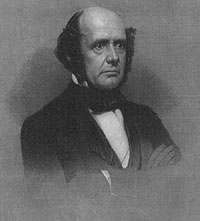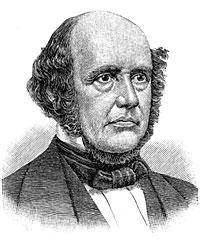George Ashmun was a Congressman from Massachusetts (Whig, 1845-51) who served with Abraham Lincoln in Congress and took a similar anti-war stance against President James Polk. Ashmun was president of the Republican National Convention in Chicago in 1860 and led a delegation of Republicans to Springfield to meet with the nominee after the convention.
Ashmun visited Senator Stephen Douglas shortly after Douglas met with President Lincoln on April 15, 1861 about the outbreak of the Civil War. He is the source of information about their conversation in which the Illinois Democrat pledged his support for the war policies of his long-time Republican rival.
Ashmun also met with President Lincoln at the White House shortly before he went to Ford’s Theater on night of assassination. According to Thomas Pendel: “On the fourteenth day of April 1865, in the evening, just previous to the time when the President and Mrs. Lincoln were going to the theatre, George Ashmun of Massachusetts, called on Mrs. Lincoln, and I showed him into the Red Parlor, took his card upstairs, and soon the President and Mrs. Lincoln, with Mr. Colfax, then Speaker of the House, came downstairs and went into the Red Parlor where Mr. Ashmun was waiting. The all entered into a lively local conversation, and came out of the Red Parlor presently, and stood in the inner corridor. Their conversation was about the trip Mr. Colfax proposed to take across the continent. They then passed out of the corridor into the main vestibule, and stood in the main entrance, where they again chatted. Mr. Colfax bade the President and Mrs. Lincoln good evening, and went upstairs to see the Private Secretary, Mr. John G. Nicolay. Mr. Ashmun went out on the portico with the President and Mrs. Lincoln, said good-bye, and started off downtown. Ned Burke and Charles Forbes, the coachman and footman, respectively, drove over to a private residence, and took in a coach Major Rathbone and Miss [Clara] Harris, who was the daughter of Senator Ira Harris of New York.”1
On February 6, 1864, Ashmun was attempting to arrange for permits to trade in cotton along the Mississippi. He was being thwarted by the Treasury Department. He wrote General Nathaniel Banks that there “can be no doubt but that [Salmon P. Chase] is desparately [sic] bent on supplanting the President. All the signs, external & internal, prove this; but Mr. L. is as fully determined to hold on, & I do not see any possibility of the success of a combination against him. I have had but little conversation with him directly on the subject, but Mrs. L. keeps me thoroughly informed of everything, – & you may rely upon the existence of the ripest state of inflammation between Mr. L. and Mr. C. This very matter of the granting of permits by Mr. C to bring cotton into our lines, in contravention of his own published regulations, may prove the spark for an explosion at any moment. It only needs to get the proofs that he has done so; & they are likely to be forthcoming in due season.”2
Ashmun later served as a director of the Union Pacific Railroad.
Footnotes
- Thomas Pendel, Thirty-Six Years in the White House, pp. 39-40.
- Harry E. Pratt, editor, Concerning Mr. Lincoln, p. 110.
Visit









